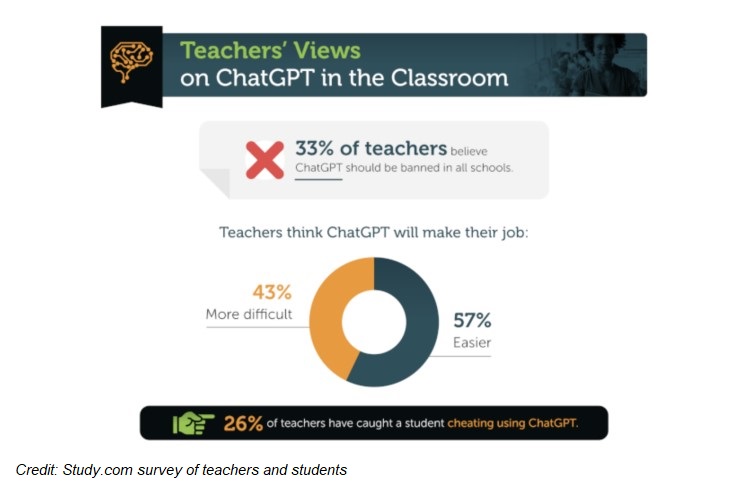Establish Transparency in School by Implementing AI Policies in School
31st October 2023

We are living in a digital era where technology keeps evolving constantly and its recent discovery is ChatGPT which is a game changer for every industry and the education industry is no exception.
The discovery of this AI technology called ChatGPT has become a concern for every school leader, admin, and teacher. According to nea.org, 26% of teachers have found their students are using ChatGPT for cheating.

ChatGPT or AI-generated content with the help of AI technology has opened a way for students to take shortcuts in their academic sessions, which becomes a huge concern for school leaders to maintain fairness and transparency in the learning process. To take back control over this situation, school leaders must come up with different strategies to combat this cheating environment in school by implementing AI policies.
In this blog post, we will be exploring multiple effective strategies to create effective AI policies to establish fairness and transparency in school again.
So, without any further delay, let’s get started.
Understanding AI-Generated Content
AI-generated content refers to digital content, such as text, images, videos, or audio, that is created by artificial intelligence systems without direct human intervention. These AI systems utilize advanced algorithms and machine-learning techniques to mimic human creativity and decision-making processes. While AI-generated content can enhance efficiency and creativity in various fields, it also raises ethical concerns surrounding plagiarism, copyright infringement, bias, and misinformation.
To get a better grasp of AI-generated content, let's turn to ChatGPT, a prominent AI chatbot. According to ChatGPT, AI-generated content is created by AI systems without human involvement and can encompass various forms of digital media. However, it is essential to address the ethical concerns associated with using and sharing AI-generated materials, such as ensuring proper attribution and addressing issues of bias and misinformation.
Why AI Policy is Necessary in Every School?
Similar to plagiarism policies, AI policies in schools are designed to help students understand what is acceptable and what is not when it comes to utilizing AI technology. While AI can be a valuable tool in education, allowing students to access information and generate ideas, it is crucial to strike a balance and ensure that students are still actively engaged in the learning process.
By implementing an AI policy, school leaders can set clear guidelines for the responsible use of AI. It helps students recognize that while AI can assist in certain tasks, it cannot replace the critical thinking and problem-solving skills they are meant to develop. Moreover, an AI policy benefits both students and teachers by fostering a fair and equitable learning environment.
AI and Plagiarism: Similarities and Differences
Some argue that existing plagiarism policies are sufficient to address AI-generated content. While AI use and plagiarism share similarities, there are distinct differences to consider. Plagiarism involves copying someone else's work and presenting it as one's own, which can occur intentionally or accidentally due to a lack of awareness or understanding. On the other hand, algorithms that pull information from various sources, potentially leading to unintentional plagiarism if the content is used without proper attribution, produce AI-generated content.
In addition to accidental plagiarism, AI-generated content also raises concerns about bias, misinformation, and the need for critical evaluation. Therefore, it is crucial to educate students about the potential issues and ensure they understand how to appropriately use AI-generated content.
Developing an AI Policy for Schools
Creating an AI policy requires careful consideration and collaboration among various stakeholders. Here are some steps to help schools get started:
Gather a Team
Form a team consisting of individuals with a strong understanding of AI technology, including administrators, teachers, students, parents, and legal advisors.
Determine Goals
Clarify the objectives of the AI policy. Decide whether it will be a separate policy or integrated into existing ethics and plagiarism policies.
Review Examples
Examine AI policies from other schools to identify relevant sections and best practices. Consider leveraging AI tools, like ChatGPT, to generate sample text for the policy.
Draft a Policy
Write the initial draft of the AI policy and subject it to the school's policy review process. Additionally, don’t forget to seek feedback from teachers, students, and families.
Make Edits and Finalize
Incorporate feedback to improve the policy's clarity and specificity. Ensure the language is accessible to all stakeholders.
Publish and Educate
Share the finalized policy with the school community. Provide training sessions to educate staff and students about responsible AI use and the school's commitment to fair and safe AI practices.
Key Components of an AI Policy for Schools
A comprehensive AI policy should cover various aspects of AI use in the educational setting. Here are some essential sections to consider:
1. Appropriate AI Use
This section outlines the acceptable ways students can use AI as a tool to support their learning. It provides clear examples of dos and don'ts, distinguishing between productive and inappropriate uses of AI. Some examples to include are:
- Using AI programs as smart search engines for easy access to information.
- Seeking clarification or explanations from AI programs when needed.
- Generating ideas, topics, and writing prompts using AI programs.
- Properly attributing AI-generated text and images when used in personal work.
On the other hand, it is essential to emphasize that students should not use AI programs to avoid doing their own work, copying content without attribution, or relying solely on AI without fact-checking and considering potential plagiarism issues.
2. Responsible AI Use
This section highlights the potential risks associated with AI use and emphasizes responsible practices. It should address concerns about sharing personal data, invading privacy, and the presence of bias and misinformation in AI-generated content. Students should be encouraged to think critically, fact-check information, and use primary sources to validate AI-generated content. Consider referencing resources that provide guidance on responsible AI use in education.
3. Reporting and Consequences
Encourage students to report any instances of AI misuse they become aware of. Lay out the potential consequences if a student is found misusing AI, aligning them with existing plagiarism policies or considering it as an ethics violation. Clearly communicate that AI violations are subject to disciplinary actions, emphasizing the importance of academic integrity.
4. Education and Awareness
Schools should commit to educating students and staff about AI technology advancements and their responsible use. Consider incorporating AI-use education as part of the curriculum or conducting dedicated sessions at the beginning of each school year. Additionally, highlights how the school itself uses AI programs, such as data collection, analysis, and automated notifications, emphasizing fair and safe practices.
Re-establish Fairness and Transparency in Schools with AI Policy
This digital era keeps producing new technology one after another, which is having a huge impact on every industry and even the education industry as well. AI technology is one of the recent discoveries that has almost all the answer people can think of and the young generation are using it to progress in their academics easily.
However, those school leaders who have pursued courses like MA in Education with Leadership and Administration know that to re-establish fairness and transparency in school they must implement certain AI policies.
Furthermore, we have also shared some of the effective ways to develop AI policies that every school leader can use to create a fair and equitable learning environment that incorporates AI as a valuable tool while emphasizing critical thinking, creativity, and academic integrity.
We believe education should be accessible for everyone. That’s why we don’t charge for our blogs. Find the right course that will help you in your career with us, contact us at - 1800 - 212 - 6400. You can mail us at act@asiancollegeofteachers.com
Written By: Sheetal Sharma